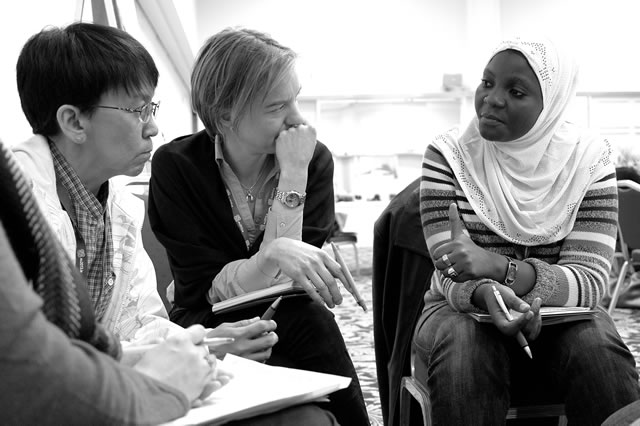Foundation Programme Manager, Mary Faherty, found something different to celebrate about the Hunger - Nutrition - Climate Justice conference, which took place in Dublin, earlier this year: participation.
Blog by Mary Faherty, Foundation Programme Manager
I don’t like conferences. I’m generally quite a practical person, more interested in action than rhetoric. In my experience, conferences mostly consist of panels of high level speakers speaking down at passive audiences and while I don’t deny that there is always something to be learned, there is something about the format that saps me of energy and enthusiasm.
So I felt slightly uneasy to be working as part of the the Foundation team that co-hosted a two-day conference with the Government of Ireland on the theme of ‘Hunger – Nutrition – Climate Justice’ on 15 and 16 April 2013.
While many of the elements followed the normal conference structure – a plush venue (the beautiful rooms of Dublin Castle), high level speakers and plenary rooms – there was something different in the design of this conference. Almost a third of those attending were on-the-ground grassroots practitioners from countries including Kenya, Ethiopia, Uganda, Antigua, Vanuatu, Mongolia, Colombia and the Philippines. People in whose name discussions would take place, people in whose name discussions on development issues often take place without their participation.
But a niggling doubt remained. Would the grassroots participants be confident enough to speak out in front of ministers, former heads of state and senior officials from international organisations? Would they have the confidence to realise that they are the experts and we must listen and learn from them?
The answer became clear to me on the afternoon of the first day, when we broke into ‘learning circles’ (small groups) to discuss the theme of empowerment and listened to presentations from people implementing projects in Bangladesh and the Caribbean. The grassroots participants dominated the discussions and it was for me one of the high points of the conference. Nothing gives greater validity to a discussion on hunger, nutrition and climate justice than hearing first-hand from the people who deal with these issues on a daily basis.
While many of the key messages that started to emerge from the conference on the last day are messages we’ve heard many times before (the need for political will, finance and resources, collective action, gender equality, power issues, blending traditional knowledge with scientific advancements, accountability and transparency) the fact that they grew out of discussions between on-the-ground experts and policy experts gives them a justified validity.
Towards the end of the conference, I asked some participants what the highlight of the conference was for them (the speech by President Michael D. Higgins on the opening day was mentioned frequently). For me, the highlight was the participation of the grassroots people who injected energy, enthusiasm and reality into the discussions.
I also asked some people what they would do differently. One participant said she would make greater linkages between climate justice and food security in her work at home. Another participant working for a non-governmental organisation said he would try to work closer with government. My own answer to this question is that I’ll be less cynical about conferences when they involve grassroots participants.
It’s the most logical thing in the world to include in discussions those whom we claim to serve. As Mitchell Lay from Antigua said, “no-one can represent you like you can represent yourself”.
The grassroots participants were the secret weapon at this conference and what resonated the most was the voices of the grassroots women. Cecilia Kibe from Kenya, a strong advocate for women’s empowerment, spoke during a panel discussion on the first day of the conference. She told the audience about a conversation she had with a man in one of the communities she works with. She was speaking about empowerment and the Kenyan man said to her “I cannot empower my wife. She is already a problem to me”. Cecilia’s plea to this response was – “if you can’t empower your wife, please empower your sister and your mother”. Now that’s lateral thinking.
Related Links:


